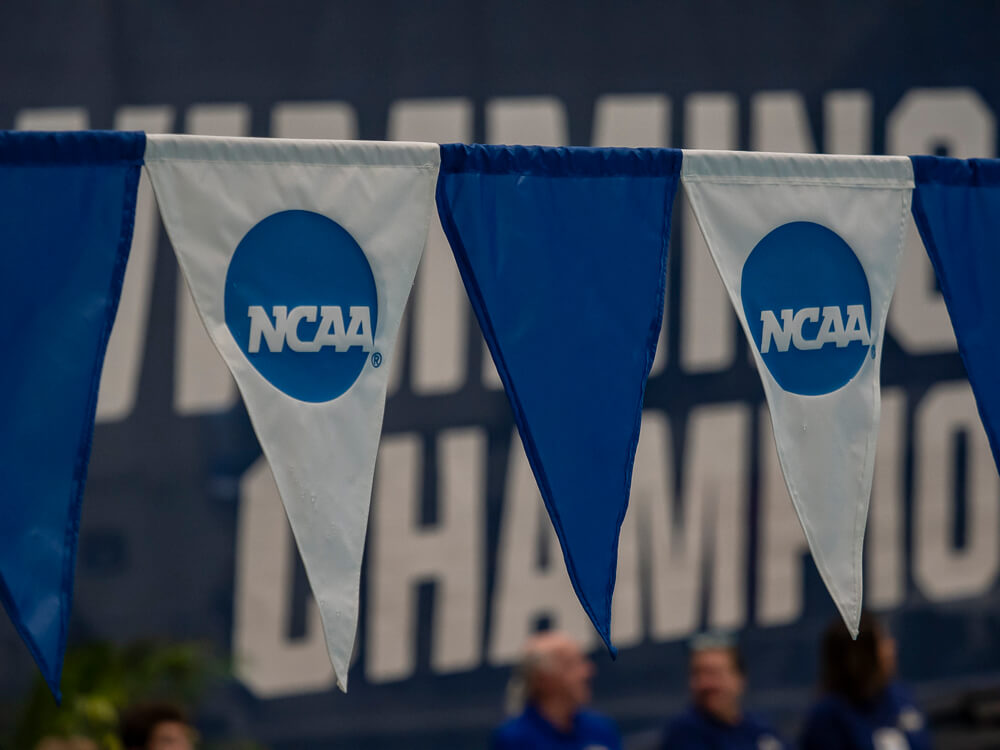Donald Trump Issues Executive Order Aiming to ‘Protect Student-Athletes… and Opportunities’
U.S. President Donald Trump has released new guidance aimed at regulating NIL payments to student-athletes. According to a White House fact sheet, the order will “protect student-athletes and collegiate athletic scholarships and opportunities, including in Olympic and non-revenue programs, and the unique American institution of college sports.”
The order is aimed at maintaining scholarships and athletic teams that have been deprioritized, defunded or discontinued in the NIL era. Dozens of swim teams and hundreds of swimmers have already seen opportunities taken away, including the recent example of Cal-Poly. The fact sheet states, “The Order requires the preservation and, where possible, expansion of opportunities for scholarships and collegiate athletic competition in women’s and non-revenue sports.”
The order further seeks to define allowable NIL payments as “legitimate, fair-market-value compensation that a third party provides to an athlete, such as for a brand endorsement.” Dozens of elite swimmers have benefitted from such rules since they were implemented in 2021, allowing them to retain their college eligibility while still earning money during their peak years. The University of Virginia is among the schools that has taken full advantage, winning five consecutive national titles while swimmers such as Kate Douglass, Gretchen Walsh and Alex Walsh received payouts from endorsement deals.
However, the new rule would prohibit NIL payments that are “pay-for-play,” seemingly targeting the collective funds assembled by boosters at universities around the country to funnel money to star players in high-revenue sports, particularly football and men’s basketball. These third-party collectives have essentially created bidding wars for schools trying to attract top talent with generous financial compensation.
The executive order provides numerous directives to federal agencies aimed at sustaining the current model of college sports. It mandates that the Secretary of Labor and the National Labor Relations Board “clarify the status of student-athletes in order to preserve non-revenue sports.” Essentially, this would prevent participants in college sports from being considered employees of their respective universities. The reasoning provided for this decision matches familiar wording from the NCAA: to maintain “the irreplaceable educational and developmental opportunities that college sports provide.”
Further, the President asked the Attorney General and Federal Trade Commission “to take appropriate actions to protect student-athletes’ rights and safeguard the long-term stability of college athletics from endless, debilitating antitrust and other legal challenges.” The order also asked for communication between the White House and organizations representing U.S. Olympic and Paralympic teams “to protect the role of college athletics in developing world-class American athletes.”
It is expected that this order will limit athlete earning potential in some cases by preventing universities from diverting funding away from non-revenue sports. However, NIL payments will no longer be the sole source of income for collegiate athletes beginning with the 2025-26 season; the finalization of the House settlement allows schools to directly share revenue with student-athletes.
Trump had previously indicated plans to create guidance for the NCAA to follow. NIL payments to student-athletes originally became permissible thanks to a patchwork of state laws, and this executive order represents the first major attempt from the national government to provide regulation after years of the NCAA lobbying for intervention.
NCAA President Charlie Baker welcomed the federal intervention for the purposes of creating “competitive balance” in college sports. ESPN reported that Baker and his organization want Congress to pass an antitrust exemption that would allow the NCAA to enforce these rules. Such legislation is contained within the SCORE Act currently working its way through Congress.
“The Association appreciates the Trump Administration’s focus on the life-changing opportunities college sports provides millions of young people and we look forward to working with student-athletes, a bipartisan coalition in Congress and the Trump Administration to enhance college sports for years to come,” Baker said, per ESPN.
The ESPN story noted significant pushback to the changes from the lawyers largely responsible for the changes coming via the House settlement. “Plain and simple, college athletes don’t need Trump’s help, and he shouldn’t be aiding the NCAA at the expense of athletes,” co-lead plaintiff attorney Steve Berman said. “For Trump to want to put his foot on their deal-making abilities is unwarranted and flouts his own philosophy on the supposed ‘art of the deal.’”
